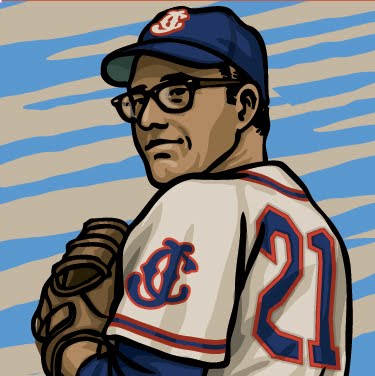Going through my old drawings trying to find yet another thing I misplaced, I found the cards I did of the 3 DiMaggio Brothers depicting them on the San Francisco Seals. For the life of me I can't remember why I shelved them, but for some reason they never saw the light of day until now. Or at least Vince will today.
Everyone knows Joe DiMaggio. Stupid novelty songs were written about him, his 56 game hitting streak is legend and his dour mug hawked Mr. Coffee machines to a whole generation of coffee fiends in those simple, care-free days before the fancy coffee-drink revolution. And those urban folksters Simon and Garfunkel even mentioned him in a hit song for Christ's sake! And speaking of Christ, that brings me to Joe's older brother Vince. Why mention the Son of God and the DiMaggio boys in the same sentence? Well, I'm guessing that being the sibling of Joltin' Joe DiMaggio was a bit like being Jesus' brother. "Why can't you be more like your brother?" Must have been rough for the oldest, Vince, and the youngest, Dom. But each had a good career in baseball, however overshadowed by Joe. See, there I go talking about Joe when I really am focusing on Vince.
As a boy, Vince DiMaggio had two dreams in life: to become an opera singer or a professional baseball player. The opera career remained elusive, but young Vince excelled at baseball. Being the eldest boy of a strict, uneducated Italian immigrant, Vince had to leave home in order to pursue his diamond dreams, bringing down the wrath of his father who disowned the wayward son. Undaunted, Vince made the Tucson Lizards ballclub in 1932 and later that season after hitting .347 with 25 home runs he was brought up to his hometown San Francisco Seals, batting .270 for them. The Seals played in the Pacific Coast League. In the days before the Dodgers and Giants moved west, the Pacific Coast League was regarded as almost a third major league. In fact many players played their whole career on the coast despite having the talent to interest major league clubs. The pay, play and of course weather was sometimes better than the big leagues could offer.
Vince quickly became known as a speedy and talented outfielder and though he sometimes connected for power, struck out a lot. The next year Vince convinced his manager, Ike Caveney to take a look at his younger brother Joe, also an outfielder. This must have really burned up his old man, who had effectively shunned Vince. Now two of his boys were turning away from the life of a fisherman. Joe's natural talent suitably impressed the Seals and he was signed to a contract. In order to make room for their new outfielder Vince was traded to Hollywood and Joe went on to hit .340 for the Seals. Vince knocked around the high minors for a few years and finally got his chance in the big leagues with the Boston Braves in 1937. By this time his father, realizing that his boys playing that crazy game of baseball wasn't going to lead them down a path to ruin, repaired his relationship with Vince and became an avid follower of the game.
With Boston he was a mediocre batter but was 10th in the league in home runs and also led the league in strike outs. In 1938 after setting a record for strike outs that would stand for almost 30 years he was traded to the Yankees who sent him to their top farm team in Kansas City where he hit a league leading 46 home runs. Cincinnati picked him up at the end of the year though he was quickly traded to the Pirates where he spent the majority of his career.
Starring for Pittsburgh during the war years, Vince was one of the few sluggers who was able to pound the special deadened baseballs used during the war. Because rubber was essential to the war effort, a substance called "balata" was used and the usual high-grade cork and rubber mixture at the center of the ball was replaced by granulated cork. The result was a dead ball with no bounce. None-the-less, Vince finished in the top 10 home run leaders 6 times during his 10 major league seasons. It ain't no Joe DiMaggio numbers, but it ain't nothing to sniff at either.
Vince, despite being shunned by his father and over shadowed by his more talented younger brothers, was a laid-back and good-natured player and well liked throughout the National League. Besides a great personality he was blessed with a superb singing voice and often sang arias to amuse himself while playing the outfield. After his career ended in the majors, Vince played minor league ball for another 6 seasons and became the manager of the Pittsburg, California Diamonds. On July 14, 1949, "Vince DiMaggio Night" at City Park, both Vince and opposing manager Ray Perry of the Reading Browns played all 9 positions for their respective teams. Each player-manager made one error and Pittsburg won 11-2.
Unlike his brother Joe who became practically a recluse after his playing days ended, Vince DiMaggio remained an affable fellow and lived with his family in California until his death from stomach cancer in 1986 at age 74.


56-game hitting streak for DiMaggio.
ReplyDeleteYep, 56, you're right, duly noted and corrected, thanks Kevin Z
ReplyDelete